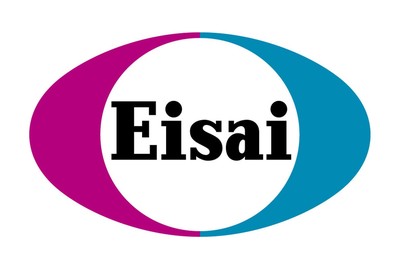Eisai will present four abstracts at the virtual Genitourinary Cancers Symposium 2021 (#GU21) from February 11-13, 2021. These investigational data include a late-breaking oral presentation from the pivotal Phase 3 CLEAR study (KEYNOTE-581/Study 307) (NCT02811861) (Abstract # 269) evaluating KEYTRUDA plus LENVIMA and LENVIMA
|
WOODCLIFF LAKE, N.J., Jan. 27, 2021 /PRNewswire/ -- Eisai will present four abstracts at the virtual Genitourinary Cancers Symposium 2021 (#GU21) from February 11-13, 2021. These investigational data include a late-breaking oral presentation from the pivotal Phase 3 CLEAR study (KEYNOTE-581/Study 307) (NCT02811861) (Abstract # 269) evaluating KEYTRUDA plus LENVIMA and LENVIMA plus everolimus versus sunitinib for the first-line treatment of patients with advanced renal cell carcinoma (RCC). Additional data to be presented include two abstracts from Study 218 (NCT03173560), which is a Phase 2 trial evaluating the safety and efficacy of two starting doses of LENVIMA (18 mg versus 14 mg once daily) plus everolimus (5 mg once daily) in patients with advanced RCC. These include a health-related quality of life outcomes analysis (Abstract # 314) as well as efficacy analyses by independent imaging review, and by subgroup of patients who received prior anti-PD-1/L1 therapy per investigator assessment (Abstract # 307). A Trial in Progress abstract will also be presented on a Phase 3 study (NCT04586231) exploring the efficacy and safety of LENVIMA plus the hypoxia-inducible factor-2 alpha (HIF-2α) inhibitor belzutifan (MK-6482) versus cabozantinib in patients with advanced RCC who received prior anti-PD-1/L1 therapy (Abstract #TPS372). "We're excited to present new investigational data on LENVIMA that we hope will provide the oncology community with optimism at this year's Genitourinary Cancers Symposium," said Dr. Takashi Owa, Vice President, Chief Medicine Creation Officer and Chief Discovery Officer, Oncology Business Group at Eisai. "We remain relentless in our pursuit to spark change in the oncology space by continuing to evaluate the LENVIMA plus everolimus combination as well as research new potential combination treatment options for renal cell carcinoma patients. We're dedicated to fighting for patients suffering from this insidious disease and we believe these results mark a big step in the direction of greater therapeutic knowledge and options for this community." In March 2018, Eisai and Merck (known as MSD outside the United States and Canada), through an affiliate, entered into a strategic collaboration for the worldwide co-development and co-commercialization of LENVIMA, both as monotherapy and in combination with Merck's anti-PD-1 therapy KEYTRUDA and Merck's HIF-2α inhibitor, belzutifan. To date, 20 trials have been initiated under the LEAP (LEnvatinib And Pembrolizumab) clinical program, which is evaluating the KEYTRUDA plus LENVIMA combination across 13 different tumor types. For more information on the LEAP program, please visit clinicaltrials.gov. This release discusses investigational compounds and investigational uses for FDA-approved products. It is not intended to convey conclusions about efficacy and safety. There is no guarantee that any investigational compounds or investigational uses of FDA-approved products will successfully complete clinical development or gain FDA approval. The full list of Eisai presentations is included below. All abstracts will be available for viewing on demand via the Genitourinary Cancers Symposium website from February 11 at 8:00 AM EST through February 13, 2021.
About Renal Cell Carcinoma (RCC) About LENVIMA® (lenvatinib) Capsules
LENVIMA, discovered and developed by Eisai, is a kinase inhibitor that inhibits the kinase activities of vascular endothelial growth factor (VEGF) receptors VEGFR1 (FLT1), VEGFR2 (KDR), and VEGFR3 (FLT4). LENVIMA inhibits other kinases that have been implicated in pathogenic angiogenesis, tumor growth, and cancer progression in addition to their normal cellular functions, including fibroblast growth factor (FGF) receptors FGFR1-4, the platelet derived growth factor receptor alpha (PDGFRα), KIT, and RET. The combination of LENVIMA and everolimus showed increased anti-angiogenic and anti-tumor activity as demonstrated by decreased human endothelial cell proliferation, tube formation, and VEGF signaling in vitro and tumor volume in mouse xenograft models of human renal cell cancer greater than each drug alone. In syngeneic mouse tumor models, lenvatinib decreased tumor-associated macrophages, increased activated cytotoxic T cells, and demonstrated greater antitumor activity in combination with an anti-PD-1 monoclonal antibody compared to either treatment alone. Important Safety Information Warnings and Precautions Hypertension. In DTC, hypertension occurred in 73% of patients on LENVIMA (44% grade 3-4). In RCC, hypertension occurred in 42% of patients on LENVIMA + everolimus (13% grade 3). Systolic blood pressure ≥160 mmHg occurred in 29% of patients, and 21% had diastolic blood pressure ≥100 mmHg. In HCC, hypertension occurred in 45% of LENVIMA-treated patients (24% grade 3). Grade 4 hypertension was not reported in HCC. Serious complications of poorly controlled hypertension have been reported. Control blood pressure prior to initiation. Monitor blood pressure after 1 week, then every 2 weeks for the first 2 months, and then at least monthly thereafter during treatment. Withhold and resume at reduced dose when hypertension is controlled or permanently discontinue based on severity. Cardiac Dysfunction. Serious and fatal cardiac dysfunction can occur with LENVIMA. Across clinical trials in 799 patients with DTC, RCC, and HCC, grade 3 or higher cardiac dysfunction occurred in 3% of LENVIMA treated patients. Monitor for clinical symptoms or signs of cardiac dysfunction. Withhold and resume at reduced dose upon recovery or permanently discontinue based on severity. Arterial Thromboembolic Events. Among patients receiving LENVIMA or LENVIMA + everolimus, arterial thromboembolic events of any severity occurred in 2% of patients in RCC and HCC and 5% in DTC. Grade 3-5 arterial thromboembolic events ranged from 2% to 3% across all clinical trials. Permanently discontinue following an arterial thrombotic event. The safety of resuming after an arterial thromboembolic event has not been established and LENVIMA has not been studied in patients who have had an arterial thromboembolic event within the previous 6 months. Hepatotoxicity. Across clinical studies enrolling 1,327 LENVIMA-treated patients with malignancies other than HCC, serious hepatic adverse reactions occurred in 1.4% of patients. Fatal events, including hepatic failure, acute hepatitis and hepatorenal syndrome, occurred in 0.5% of patients. In HCC, hepatic encephalopathy occurred in 8% of LENVIMA-treated patients (5% grade 3-5). Grade 3-5 hepatic failure occurred in 3% of LENVIMA-treated patients. 2% of patients discontinued LENVIMA due to hepatic encephalopathy and 1% discontinued due to hepatic failure. Monitor liver function prior to initiation, then every 2 weeks for the first 2 months, and at least monthly thereafter during treatment. Monitor patients with HCC closely for signs of hepatic failure, including hepatic encephalopathy. Withhold and resume at reduced dose upon recovery or permanently discontinue based on severity. Renal Failure or Impairment. Serious including fatal renal failure or impairment can occur with LENVIMA. Renal impairment was reported in 14% and 7% of LENVIMA-treated patients in DTC and HCC, respectively. Grade 3-5 renal failure or impairment occurred in 3% of patients with DTC and 2% of patients with HCC, including 1 fatal event in each study. In RCC, renal impairment or renal failure was reported in 18% of LENVIMA + everolimus–treated patients (10% grade 3). Initiate prompt management of diarrhea or dehydration/hypovolemia. Withhold and resume at reduced dose upon recovery or permanently discontinue for renal failure or impairment based on severity. Proteinuria. In DTC and HCC, proteinuria was reported in 34% and 26% of LENVIMA-treated patients, respectively. Grade 3 proteinuria occurred in 11% and 6% in DTC and HCC, respectively. In RCC, proteinuria occurred in 31% of patients receiving LENVIMA + everolimus (8% grade 3). Monitor for proteinuria prior to initiation and periodically during treatment. If urine dipstick proteinuria ≥2+ is detected, obtain a 24-hour urine protein. Withhold and resume at reduced dose upon recovery or permanently discontinue based on severity. Diarrhea. Of the 737 LENVIMA-treated patients in DTC and HCC, diarrhea occurred in 49% (6% grade 3). In RCC, diarrhea occurred in 81% of LENVIMA + everolimus–treated patients (19% grade 3). Diarrhea was the most frequent cause of dose interruption/reduction, and diarrhea recurred despite dose reduction. Promptly initiate management of diarrhea. Withhold and resume at reduced dose upon recovery or permanently discontinue based on severity. Fistula Formation and Gastrointestinal Perforation. Of the 799 patients treated with LENVIMA or LENVIMA + everolimus in DTC, RCC, and HCC, fistula or gastrointestinal perforation occurred in 2%. Permanently discontinue in patients who develop gastrointestinal perforation of any severity or grade 3-4 fistula. QT Interval Prolongation. In DTC, QT/QTc interval prolongation occurred in 9% of LENVIMA-treated patients and QT interval prolongation of >500 ms occurred in 2%. In RCC, QTc interval increases of >60 ms occurred in 11% of patients receiving LENVIMA + everolimus and QTc interval >500 ms occurred in 6%. In HCC, QTc interval increases of >60 ms occurred in 8% of LENVIMA-treated patients and QTc interval >500 ms occurred in 2%. Monitor and correct electrolyte abnormalities at baseline and periodically during treatment. Monitor electrocardiograms in patients with congenital long QT syndrome, congestive heart failure, bradyarrhythmias, or those who are taking drugs known to prolong the QT interval, including Class Ia and III antiarrhythmics. Withhold and resume at reduced dose upon recovery based on severity. Hypocalcemia. In DTC, grade 3-4 hypocalcemia occurred in 9% of LENVIMA-treated patients. In 65% of cases, hypocalcemia improved or resolved following calcium supplementation with or without dose interruption or dose reduction. In RCC, grade 3-4 hypocalcemia occurred in 6% of LENVIMA + everolimus– treated patients. In HCC, grade 3 hypocalcemia occurred in 0.8% of LENVIMA-treated patients. Monitor blood calcium levels at least monthly and replace calcium as necessary during treatment. Withhold and resume at reduced dose upon recovery or permanently discontinue depending on severity. Reversible Posterior Leukoencephalopathy Syndrome. Across clinical studies of 1,823 patients who received LENVIMA as a single agent, RPLS occurred in 0.3%. Confirm diagnosis of RPLS with MRI. Withhold and resume at reduced dose upon recovery or permanently discontinue depending on severity and persistence of neurologic symptoms. Hemorrhagic Events. Serious including fatal hemorrhagic events can occur with LENVIMA. In DTC, RCC, and HCC clinical trials, hemorrhagic events, of any grade, occurred in 29% of the 799 patients treated with LENVIMA as a single agent or in combination with everolimus. The most frequently reported hemorrhagic events (all grades and occurring in at least 5% of patients) were epistaxis and hematuria. In DTC, grade 3-5 hemorrhage occurred in 2% of LENVIMA-treated patients, including 1 fatal intracranial hemorrhage among 16 patients who received LENVIMA and had CNS metastases at baseline. In RCC, grade 3-5 hemorrhage occurred in 8% of LENVIMA + everolimus–treated patients, including 1 fatal cerebral hemorrhage. In HCC, grade 3-5 hemorrhage occurred in 5% of LENVIMA-treated patients, including 7 fatal hemorrhagic events. Serious tumor-related bleeds, including fatal hemorrhagic events, occurred in LENVIMA-treated patients in clinical trials and in the postmarketing setting. In postmarketing surveillance, serious and fatal carotid artery hemorrhages were seen more frequently in patients with anaplastic thyroid carcinoma (ATC) than other tumors. Safety and effectiveness of LENVIMA in patients with ATC have not been demonstrated in clinical trials. Consider the risk of severe or fatal hemorrhage associated with tumor invasion or infiltration of major blood vessels (eg, carotid artery). Withhold and resume at reduced dose upon recovery or permanently discontinue based on severity. Impairment of Thyroid Stimulating Hormone Suppression/Thyroid Dysfunction. LENVIMA impairs exogenous thyroid suppression. In DTC, 88% of patients had baseline thyroid stimulating hormone (TSH) level ≤0.5 mU/L. In patients with normal TSH at baseline, elevation of TSH level >0.5 mU/L was observed post baseline in 57% of LENVIMA-treated patients. In RCC and HCC, grade 1 or 2 hypothyroidism occurred in 24% of LENVIMA + everolimus–treated patients and 21% of LENVIMA-treated patients, respectively. In patients with normal or low TSH at baseline, elevation of TSH was observed post baseline in 70% of LENVIMA-treated patients in HCC and 60% of LENVIMA + everolimus–treated patients in RCC. Monitor thyroid function prior to initiation and at least monthly during treatment. Treat hypothyroidism according to standard medical practice. Impaired Wound Healing. Impaired wound healing has been reported in patients who received LENVIMA. Withhold LENVIMA for at least 1 week prior to elective surgery. Do not administer for at least 2 weeks following major surgery and until adequate wound healing. The safety of resumption of LENVIMA after resolution of wound healing complications has not been established. Osteonecrosis of the Jaw (ONJ). ONJ has been reported in patients receiving LENVIMA. Concomitant exposure to other risk factors, such as bisphosphonates, denosumab, dental disease, or invasive dental procedures, may increase the risk of ONJ. Perform an oral examination prior to treatment with LENVIMA and periodically during LENVIMA treatment. Advise patients regarding good oral hygiene practices and to consider having preventive dentistry performed prior to treatment with LENVIMA and throughout treatment with LENVIMA. Avoid invasive dental procedures, if possible, while on LENVIMA treatment, particularly in patients at higher risk. Withhold LENVIMA for at least 1 week prior to scheduled dental surgery or invasive dental procedures, if possible. For patients requiring invasive dental procedures, discontinuation of bisphosphonate treatment may reduce the risk of ONJ. Withhold LENVIMA if ONJ develops and restart based on clinical judgement of adequate resolution. Embryo-fetal Toxicity. Based on its mechanism of action and data from animal reproduction studies, LENVIMA can cause fetal harm when administered to pregnant women. In animal reproduction studies, oral administration of lenvatinib during organogenesis at doses below the recommended clinical doses resulted in embryotoxicity, fetotoxicity, and teratogenicity in rats and rabbits. Advise pregnant women of the potential risk to a fetus; and advise females of reproductive potential to use effective contraception during treatment with LENVIMA and for at least 30 days after the last dose. Adverse Reactions In RCC, the most common adverse reactions (≥30%) observed in LENVIMA + everolimus–treated patients were diarrhea (81%), fatigue (73%), arthralgia/myalgia (55%), decreased appetite (53%), vomiting (48%), nausea (45%), stomatitis (44%), hypertension (42%), peripheral edema (42%), cough (37%), abdominal pain (37%), dyspnea (35%), rash (35%), decreased weight (34%), hemorrhagic events (32%), and proteinuria (31%). The most common serious adverse reactions (≥5%) were renal failure (11%), dehydration (10%), anemia (6%), thrombocytopenia (5%), diarrhea (5%), vomiting (5%), and dyspnea (5%). Adverse reactions led to dose reductions or interruption in 89% of patients. The most common adverse reactions (≥5%) resulting in dose reductions were diarrhea (21%), fatigue (8%), thrombocytopenia (6%), vomiting (6%), nausea (5%), and proteinuria (5%). Treatment discontinuation due to an adverse reaction occurred in 29% of patients. In HCC, the most common adverse reactions (≥20%) observed in LENVIMA-treated patients were hypertension (45%), fatigue (44%), diarrhea (39%), decreased appetite (34%), arthralgia/myalgia (31%), decreased weight (31%), abdominal pain (30%), palmar-plantar erythrodysesthesia syndrome (27%), proteinuria (26%), dysphonia (24%), hemorrhagic events (23%), hypothyroidism (21%), and nausea (20%). The most common serious adverse reactions (≥2%) were hepatic encephalopathy (5%), hepatic failure (3%), ascites (3%), and decreased appetite (2%). Adverse reactions led to dose reductions or interruption in 62% of patients. The most common adverse reactions (≥5%) resulting in dose reductions were fatigue (9%), decreased appetite (8%), diarrhea (8%), proteinuria (7%), hypertension (6%), and palmar-plantar erythrodysesthesia syndrome (5%). Treatment discontinuation due to an adverse reaction occurred in 20% of patients. The most common adverse reactions (≥1%) resulting in discontinuation of LENVIMA were fatigue (1%), hepatic encephalopathy (2%), hyperbilirubinemia (1%), and hepatic failure (1%). In EC, the most common adverse reactions (≥20%) observed in LENVIMA + pembrolizumab - treated patients were fatigue (65%), hypertension (65%), musculoskeletal pain (65%), diarrhea (64%), decreased appetite (52%), hypothyroidism (51%), nausea (48%), stomatitis (43%), vomiting (39%), decreased weight (36%), abdominal pain (33%), headache (33%), constipation (32%), urinary tract infection (31%), dysphonia (29%), hemorrhagic events (28%), hypomagnesemia (27%), palmar-plantar erythrodysesthesia (26%), dyspnea (24%), cough (21%) and rash (21%). Adverse reactions led to dose reduction or interruption in 88% of patients receiving LENVIMA. The most common adverse reactions (≥5%) resulting in dose reduction or interruption of LENVIMA were fatigue (32%), hypertension (26%), diarrhea (18%), nausea (13%), palmar-plantar erythrodysesthesia (13%), vomiting (13%), decreased appetite (12%), musculoskeletal pain (11%), stomatitis (9%), abdominal pain (7%), hemorrhages (7%), renal impairment (6%), decreased weight (6%), rash (5%), headache (5%), increased lipase (5%) and proteinuria (5%). Fatal adverse reactions occurred in 3% of patients receiving LENVIMA + pembrolizumab, including gastrointestinal perforation, RPLS with intraventricular hemorrhage, and intracranial hemorrhage. Serious adverse reactions occurred in 52% of patients receiving LENVIMA + pembrolizumab. Serious adverse reactions in ≥3% of patients were hypertension (9%), abdominal pain (6%), musculoskeletal pain (5%), hemorrhage (4%), fatigue (4%), nausea (4%), confusional state (4%), pleural effusion (4%), adrenal insufficiency (3%), colitis (3%), dyspnea (3%), and pyrexia (3%). Permanent discontinuation due to adverse reaction (Grade 1-4) occurred in 21% of patients who received LENVIMA + pembrolizumab. The most common adverse reactions (>2%) resulting in discontinuation of LENVIMA were gastrointestinal perforation or fistula (2%), muscular weakness (2%), and pancreatitis (2%). Use in Specific Populations No dose adjustment is recommended for patients with mild (CLcr 60-89 mL/min) or moderate (CLcr 30-59 mL/min) renal impairment. LENVIMA concentrations may increase in patients with DTC, RCC or EC and severe (CLcr 15-29 mL/min) renal impairment. Reduce the dose for patients with DTC, RCC, or EC and severe renal impairment. There is no recommended dose for patients with HCC and severe renal impairment. LENVIMA has not been studied in patients with end stage renal disease. No dose adjustment is recommended for patients with HCC and mild hepatic impairment (Child-Pugh A). There is no recommended dose for patients with HCC with moderate (Child-Pugh B) or severe (Child-Pugh C) hepatic impairment. No dose adjustment is recommended for patients with DTC, RCC, or EC and mild or moderate hepatic impairment. LENVIMA concentrations may increase in patients with DTC, RCC, or EC and severe hepatic impairment. Reduce the dose for patients with DTC, RCC, or EC and severe hepatic impairment. LENVIMA (lenvatinib) is available as 10 mg and 4 mg capsules. Please see Prescribing information for LENVIMA (lenvatinib) at http://www.lenvima.com/pdfs/prescribing-information.pdf. About the Eisai and Merck Strategic Collaboration In addition to ongoing clinical studies evaluating the KEYTRUDA plus LENVIMA combination across several different tumor types, the companies have jointly initiated new clinical studies through the LEAP (LEnvatinib And Pembrolizumab) clinical program and are evaluating the combination in 13 different tumor types (endometrial carcinoma, hepatocellular carcinoma, melanoma, non-small cell lung cancer, renal cell carcinoma, squamous cell carcinoma of the head and neck, urothelial cancer, biliary tract cancer, colorectal cancer, gastric cancer, glioblastoma, ovarian cancer, and triple-negative breast cancer) across 20 clinical trials. About Eisai For more information about Eisai, please visit www.eisai.com (for global), us.eisai.com (for U.S.) or www.eisai.eu (for Europe, Middle East, Africa), and connect with us on Twitter (U.S. and global) and LinkedIn (for U.S.). LENVIMA® is a registered trademark used by Eisai Inc. under license from Eisai R&D Management Co., Ltd. KEYTRUDA® is a registered trademark of Merck Sharp & Dohme Corp., a subsidiary of Merck & Co., Inc., Kenilworth, N.J., U.S.A.
SOURCE Eisai Inc. |





